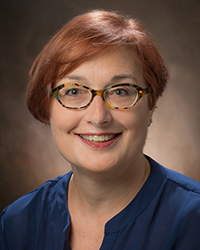Award Winners Announced for Excellence in Disciplinary Writing Instruction

This year, Miami awarded the Roger & Joyce Howe Award for Excellence in Disciplinary Writing Instruction for the first time. This award honors individuals or teams of faculty who have made concerted and continuing efforts to innovate writing instruction in their disciplines. The award additionally recognizes applicant efforts to ensure their students have multiple opportunities to write across their educational experiences. While the University Award Ceremony had to be canceled due to the coronavirus pandemic, we want to celebrate the winners and the important and innovative work they've been doing.
Individual Award Winners
Joseph Johnson, Professor, Psychology

Dr. Johnson demonstrates the difference that one faculty member can make when committed to core practices around the teaching and learning of writing in a discipline. He has been working for 15 years to improve disciplinary writing in psychology at Miami on many fronts. He redesigned the PSY 293/294 course sequence required of all majors to a problem-based approach that includes writing in both and created a set of scaffolded materials for the sequence; he conducted training for the graduate students teaching the associated lab sections; he worked on a departmental committee that added a capstone course, PSY 410, to ensure continued writing in the major. His work resulted in an approved Advanced Writing plan for his department. He has since spearheaded an effort to revise the 293/294 curriculum, demonstrating a commitment to ongoing reflection and revision in pedagogical practices. He also founded an undergraduate research journal in the Psychology department, in order to provide a venue for disseminating the best honors theses written by psychology students each year. To support this work, he developed a course in editing and publishing, PSY 394, in which the journal’s undergraduate editors could be trained. As the inaugural Director of Undergraduate Research, he designed a two-course sequence, UNV 171/72, where first-year students could conduct and present original research. He also leads the professional development seminar, PSY 603/604, required of all doctoral students, and includes instruction on genres important to the discipline.
Jennifer Kinney, Professor, Gerontology

Jennifer Kinney exemplifies the teacher/scholar model for which Miami is rightly known. She has worked tirelessly with her colleagues in gerontology to support the teaching and learning of writing for gerontology graduate students. Although she has been consulting with the Howe Center for Writing Excellence staff for many years, in Summer 2018 she completed the Howe Faculty Writing Fellows Program with two of her colleagues. As a result of their thinking in that program, she worked to completely redesign the support for writing across the graduate curriculum, pushed students to take the teaching certification offered by CTE, and then in curricular space left by that move, designed an innovative new course, GTY705, devoted to helping graduate students write in the ways that the field expects, and draft both articles and grant proposals. She created a scaffolded set of assignments to help students understand the rhetorical moves of various academic genres, and work to enact those moves themselves. She and her colleagues created a disciplinary writing guide which the HCWE shares on its website, outlining the interdisciplinary nature of writing in gerontology, and the characteristics of what she describes as the “gerontological voice.” She and her colleagues have been highlighted twice in the HCWE’s Miami Writing Spotlights, once for overall curriculum redesign, and a second time for her innovations in GTY705. Dr. Kinney is a tireless advocate for her students, and they recognize this, sending in five letters of support for this award, where they praised her transformational, innovative and transparent pedagogy. Dr. Kinney’s pedagogical transformations are seeing publication, as she is currently working on a book chapter for an edited collection and an academic paper on writing in gerontology.
Team Award Winners
Department of Philosophy: Keith Fennen, Associate Teaching Professor; Gaile Pohlhaus, Associate Professor; Elaine Miller, Professor and Department Chair
Drs. Fennen, Pohlhaus, and Miller represent the very best of what is possible when groups of faculty team up to innovate and revise their curriculum in ways that align with their discipline’s values and practices, while also recognizing the need to explain to students, parents, employers, and the public at large the value of a degree in the humanities. They have worked tirelessly since May 2018 to implement a “mindful, coherent system of practices for teaching students how to write philosophy.” After completing the Howe Faculty Writing Fellows Program in May 2018 (work highlighted in a Miami Writing Spotlight), they entirely revised their department Advanced Writing course (and then revised it again after teaching it), created and delivered a set of pedagogy workshops for their full faculty, articulated a set of statements and resources about writing in philosophy that they use in their courses and share more broadly via the HCWE website, undertook serious curriculum redevelopment for their complete undergraduate program, and are implementing a portfolio requirement for their majors to showcase their work--and which will also be used for a more comprehensive departmental assessment of writing and critical thinking. All of this work is being coupled with a new career liaison position the department has created in an effort to help students recognize how the reading and writing skills they have cultivated in the philosophy major will lead to a meaningful career pathway. Not only this, but Elaine, Gaile, and Keith are also publishing about their innovations: they are writing a chapter for a forthcoming edited collection, and are also drafting a textbook about teaching writing in philosophy.


